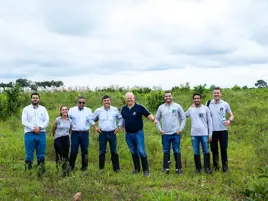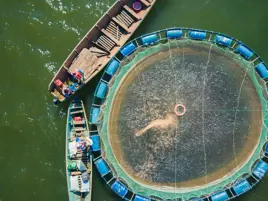-
 Fostering Communities
Fostering CommunitiesDe Heus opens three brand new factories in Uganda, India and Kenya
In a significant and unprecedented milestone, three new De Heus feed mills are commencing operations in Uganda, India and Kenya — all within a period of just three months. By providing safe, high-quality feed, these facilities will help local farmers improve their business performance and contribute to sustainable food supplies in these countries. This remarkable achievement demonstrates De Heus’ capacity to rapidly scale its impact across multiple geographies, reinforcing its long-term vision for responsible food production.
-
Our social responsibility
Learn more about our sustainability initiatives and how our social responsibility is brought into practise
-
 Fostering Communities
Fostering CommunitiesConnections that contribute to a better future
On a recent visit to Pará, De Heus employees saw first-hand the positive impact of the Black Jaguar Foundation's ecological restoration project, which the company has supported since 2021.
-
 Fostering Communities
Fostering CommunitiesDe Heus Kidzz: Food education for the next generation
De Heus wants to teach the next generation consumers how our food is produced. What started off as a project on the side, turned into a fast-growing educational website that’s about to go global.
-
 Fostering Communities
Fostering CommunitiesDe Heus visits Black Jaguar Foundation's environmental restoration areas in Pará
With significant socio-environmental impact, the project promotes preservation and restoration of degraded areas in the Araguaia Biodiversity Corridor for the benefit of the local community and beyond. The size of the corridor has the potential to have a positive effect on all of us everywhere and to truly make a difference.
-
 Fostering Communities
Fostering CommunitiesHealthy fish need clean water
All around the world, the mismanagement of plastic waste is a big issue. As the waste carries over to nearby rivers and leaks into our oceans, the waters in which many of De Heus’ customers grow their fish are increasingly polluted. One day a year, De Heus Myanmar aqua feed factory workers take it to the streets of Yangon to raise awareness about the global plastic problem. In charge of coordinating the troops is Rachel Twhe, project manager at De Heus Myanmar.
-
 Fostering Communities
Fostering CommunitiesInternational professionalisation of local livestock farms
As an internationally oriented animal feed supplier, we consider it our duty to promote professionalisation of local livestock farming. And we do not limit ourselves to the optimisation of efficient conversion of raw materials into animal proteins, we also make use of local raw materials, and help to improve both the quality and the food safety of the produced food products
-
 Fostering Communities
Fostering CommunitiesPioneering sustainable aquaculture for a growing world
At De Heus, we believe in more than just providing feed; we aim for a sustainable and efficient aquaculture. In a world witnessing rapid population growth and increasing demand for animal protein, we recognize the need for responsible and high productive forward-thinking practices. De Heus aims to be part of an aquaculture industry that is recognized for productive sustainable farming and positive global impact.
-
 Fostering Communities
Fostering CommunitiesPlanting mangrove forests to contribute to sustainability
Mangrove forests are an important tool in the fight against climate change. That's why the Indonesian government has committed to an ambitious programme of mangrove reforestation in the coming years. As part of its sustainability activities, De Heus Indonesia partnered with the government in a mangrove planting project in East Java. Based on the results of this project, our colleagues are using the knowledge and experience gained to develop other mangrove projects.
-
 Fostering Communities
Fostering CommunitiesHow a De Heus plant can support fish farming in Uganda and help feed the nation
In June 2023, De Heus began construction of its first dedicated aquafeed plant in Uganda. Located in Njeru, near Jinja, on the north shore of Lake Victoria, the factory is expected to start operations early next year. Once the facility reaches full capacity, it will produce some 50,000 tons of fish feed per year, helping to support a rapidly developing aquaculture industry. In addition, it will help to improve the diet and food security of the country's growing population and boost local agriculture.
Sustainability
Our sustainability journey
Responsible Feeding
CSR documents and magazines
A story of hope and action


